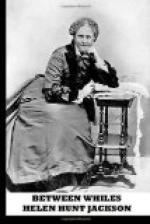It seemed that a man sentenced in Mayence to be executed for murder had confessed, the day before his execution, that it was he who had killed the shepherd of whose death Carl Lepmann had so long been held guilty. They had quarrelled about a girl, a faithless creature, forsworn to both of them, and worth no man’s love or desire; but jealous anger got the better of their sense, and they grappled in fight, each determined to kill the other.
The shepherd had the worst of it; and just as he fell, mortally hurt, Carl Lepmann had come up,—had come up in time to see the murderer leap on his horse to ride away.
In a voice, which the man said had haunted him ever since, Carl had cried out: “My God! You ride away and leave him dead! and it will be I who have killed him, for this morning we fought so they had to tear us apart!”
Smitten with remorse, the man had with Carl’s help lifted the body and thrown it over the precipice, at the foot of which it was afterward found. He then endeavored to persuade the lad that it would never be discovered, and he might safely return to his employer’s farm. But Carl’s terror was too great, and he had finally been so wrought upon by his entreaties that he had taken him two days’ journey, by lonely ways, the two riding sometimes in turn, sometimes together,—two days’ and two nights’ journey,—till they reached the sea, where Carl had taken ship for America.
“He was a good lad, a tender-hearted lad,” said the murderer. “He might have accused me in many a village, and stood as good chance to be believed as I, if he had told where the shepherd’s body was thrown; but he could be frightened as easily as a woman, and all he thought of was to fly where he would never be heard of more. And it was the thought of him, from that day till now, has given me more misery than the thought of the dead man!”
Carlen was crying bitterly; the letter was just ended, when Alf came into the room asking bewilderedly what it was all about.
The name Wilhelm meant nothing to him. It was the summer before Wilhelm came that he had begun this Oregon farm, which he, from the first, had fondly dedicated to Carlen in his thoughts; and when he went back to Pennsylvania after her, he found her the same as when he went away, only comelier and sweeter. It would not be easy to give Alf an uncomfortable thought about his Carlen. But he did not like to see her cry.
Neither, when he had heard the whole story, did he see why her tears need have flowed so freely. It was sad, no doubt, and a bitter shame too, for one man to suffer and go to his grave that way for the sin of another. But it was long past and gone; no use in crying over it now.
“What a tender-hearted, foolish wife it is!” he said in gruff fondness, laying his hand on Carlen’s shoulder, “crying over a man dead and buried these seven years, and none of our kith or kin, either. Poor fellow! It was a shame!”




